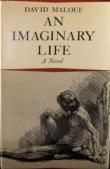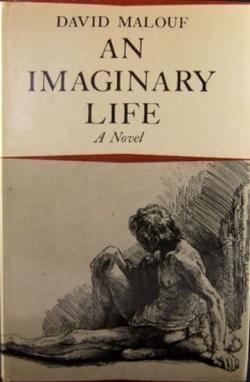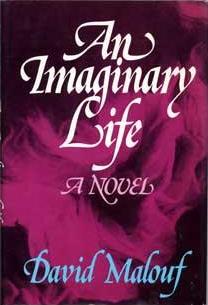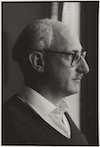AustLit
-
Malouf's second novel, An Imaginary Life was published by Chatto & Windus in 1978.
An Imaginary Life follows the Roman poet Ovid when, by express order of the emperor Augustus, without intervention of the Senate or a judge, he is banished to Tomis (now Constanța) on the Black Sea (in what is now Romania), in CE 8.
Tomis, a former Greek colony, had been captured by the Romans in BCE 29, barely thirty-five years before Ovid's exile, and he found the town desolate. He despaired in his exile, writing elegiac poems, and died, still in Tomis, in CE 17 or 18.
Malouf takes Ovid's exile as a starting point, and places the mourning poet in a desolate space where he cannot speak the language and where he befriends a wild boy, raised by wolves.
-
 This image has been sourced from onlineSee full AustLit entry
This image has been sourced from onlineSee full AustLit entry'In prose that is both elegant and lyrical, David Malouf departs from the little-known facts of Ovid's exile beyond the pale of civilization to create a deeply moving novel of extraordinary beauty. An outcast in a vast wasteland at the edge of the Black Sea, Ovid discovers a feral child. As he teaches the boy to speak the language of the civilized world, the child tutors him in his own tongue, the language of nature, and the once barren landscape begins to resonate with meaning.
(...more) -
Originally published in Australian Literary Studies (vol.10, no.4, 1982: pp.419-428), Peter Bishop's article has been republished by AustLit as a full-text resource. In his opening paragraph, Bishop writes:
David Malouf's novel, An Imaginary Life, is a particularly useful text with which to apply an imaginal reading. Malouf is commonly regarded as placing a primacy on the imagination and the ‘inner’ world in general. In two fairly recent interviews, this psychological, almost mystical quality, has been prominent. In much the same way that a ‘feminist’ reading of a text which purports to be ‘feminist’, or a ‘socialist’
reading of an espoused ‘socialist’ text are powerful because they attempt a critique of the text on its own terrain, I feel that an imaginal reading of Malouf's work is appropriate. In this reading I hope to uncover not just tensions and problems in Malouf's psychological drama, but also to develop some concepts of imaginal discourse.
To access the article, follow this link.
-
Saadi Nikro's article (published in Postcolonial text, vol.2, no. 2 [2006]) explores two of Malouf's novels, An Imaginary Life and Remembering Babylon, arguing that they 'simultaneously foreground and are somehow caught up with the romantic investment in a figure of Otherness as a rite of passage to a more authentic sense of self.'
To read the article in full, follow this link.
-
Peter Morton, an associate professor in the Department of English and Creative Writing at Flinders University, published this piece on Malouf's An Imaginary Life on his professional blog. In it, he focuses not on the argument that the novel is 'just as much–more, indeed–about Australia than it is about Ovid on the Black Sea' (which he argues has been argued enough) but about the historicity of that exiled Ovid:
Putting aside all the scholarship on the ethnology of Romania in antiquity, is there truly a disjunction between what Malouf calls 'historical fiction' on the one hand, and 'fiction with its roots in possible event' on the other? Surely not: historical fiction is fiction which is sufficiently firmly rooted in past events to make the necessary extrapolations plausible.
To read the article in full, follow this link.
-
Veronica Brady's article (published in Le Simplegadi in 2010) positions Malouf's An Imaginary Life with Joseph Furphy's Such Is Life:
The task of imagining those of us who are not of Aboriginal descent into existence in this strange new land (Australia) for two hundred years, which is a very short time in world history, is both challenging and necessary. This paper explores two attempts in doing so as presented in Joseph Furphy's 'Such Is Life', published in 1903, and David Malouf's more recent 'An Imaginary Life', published in 1978.
To read the article in full, follow this link (article begins on page 16).
-
Ioannis Ziogas's chapter was originally published in Two Thousand Years of Solitude: Exile After Ovid (Oxford University Press, 2012). In it, Ziogas argues that
Metamorphosis, death, and exile are fused together in Ovid and Malouf, transposing the reality of the poet's exile to the fictions of his Metamorphosis and relocating Ovid's banishment to the fabulous world of his poetry.'
This version of the chapter has been uploaded to academia.edu
To read the chapter in full, follow this link.
-
In this review, originally published on 14 July 1978, Broyard writes:
Perhaps Mr. Malouf takes too great a liberty with Ovid. Some of us would prefer to think that poets cannot change their spots, that culture is a fatal disease, that alexandrines are more interesting than birdcalls.
To read the review in its entirety, follow this link.
You might be interested in...






